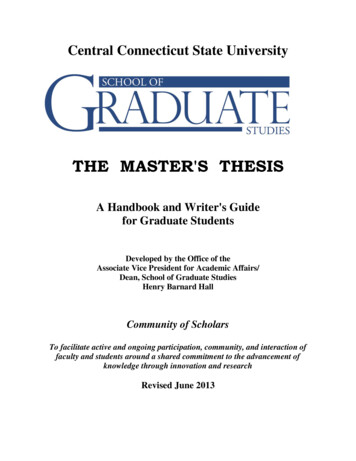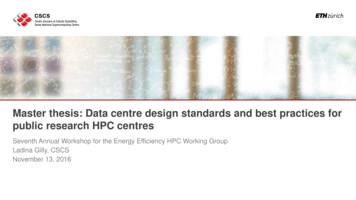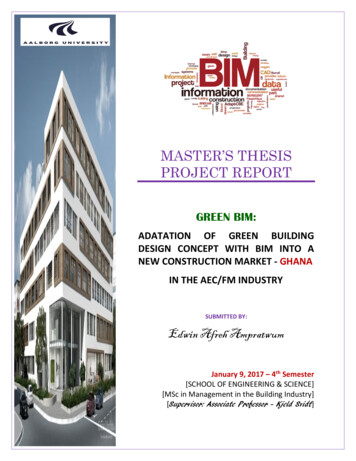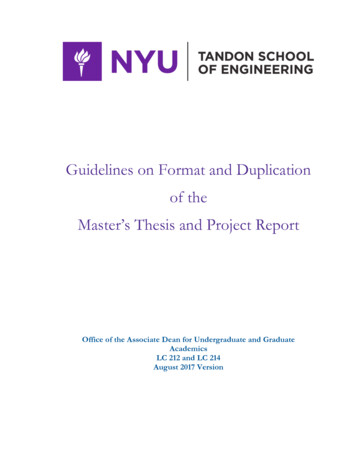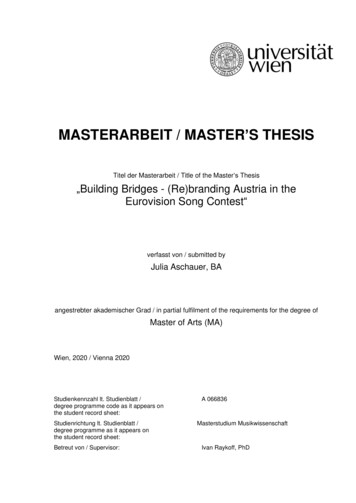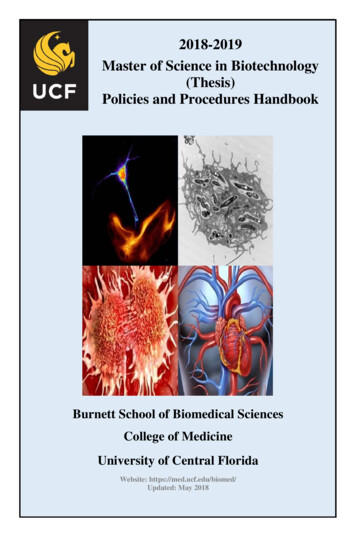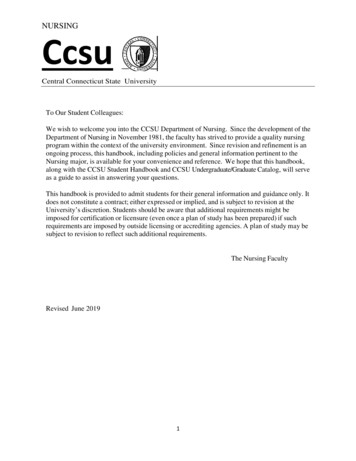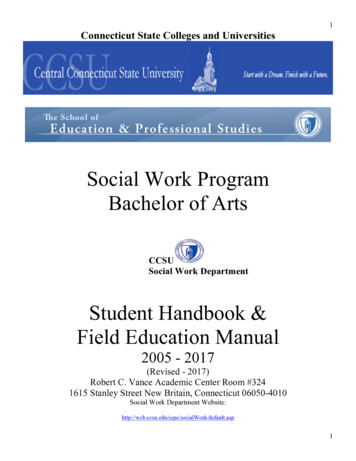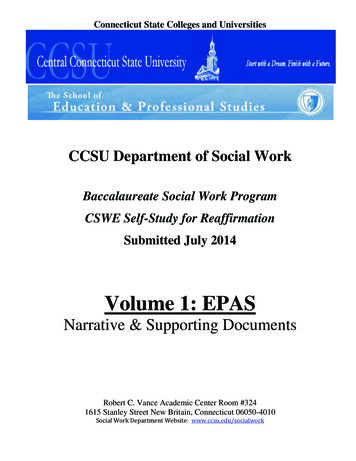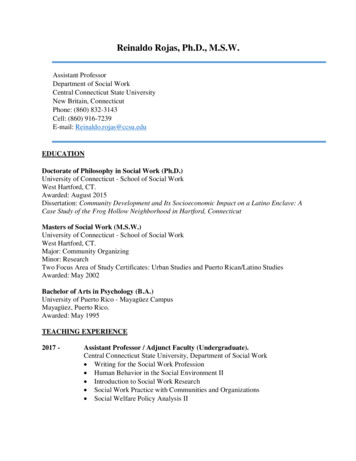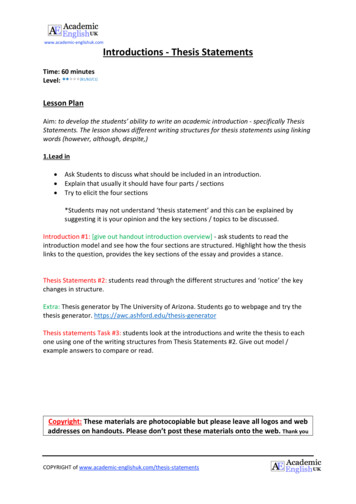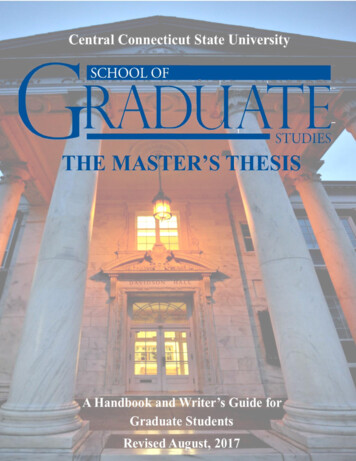
Transcription
THE MASTER’S THESISA Handbook and Writer’s Guide for Graduate StudentsTable of ContentsPageIntroduction1Chapter 1What is a Thesis? Quantitative versus Qualitative Theses2Chapter 2The Thesis Process Do’s and Don’ts for Selecting Thesis Topics Steps in the Thesis Process Thesis Advisor Five Key Issues: Time, Cost, Access, Faculty, Support & Approval Human or Animal Subjects Effective Strategies Oral Presentation or DefenseChapter 3University Policies and Requirements Registering for the Thesis Thesis Workshop Continuing Registration (CREG Fee) Thesis Committee Use of Human Subjects or Animals in Your Research Thesis Proposal Thesis FormatsThesis Style Requirements Thesis Cover Page Abstract Cover Page Guidelines for Writing an Abstract Margins, Fonts, and Spacing Biographical Note41216Policies Regarding Approval of Thesis17 Submission Instructions Digitized/Electronic Submission Guidelines and Specifications for Submitting Your Thesis in Digital Format Capstone Rubric Bound Personal Copy of Thesis Final Thesis Submission Checklist Thesis Deadlines
Table of Contents (Continued)Chapter 4Specific Department Requirements Department Requirements Examples of Outstanding ThesesReferences2127
IntroductionCongratulations! You are going to write a Master's thesis, a demanding and intellectuallychallenging task. As one of the capstone experiences of graduate study at Central ConnecticutState University, the Master's thesis signifies a rite of passage. You will learn and practice theskills required for organized research and documentation, analysis of information and effectivewritten communication. You are making the transition from one who is a consumer ofknowledge to one who actively contributes to the knowledge base of their discipline. You arebecoming part of the Graduate Studies Community of Scholars by advancing knowledge throughyour research.This handbook is prepared so that students may successfully complete their thesis work. Itcontains an overview of the thesis process, from start to finish, as well as specific thesisrequirements of individual departments. It has four chapters. Chapter 1 defines what a thesis is,while Chapter 2 provides an overview of the thesis process-the steps one must take from theinitial conceptualization of a possible thesis idea to the finished project. The third chapterdiscusses specific standards required by the School of Graduate Studies to guide studentsthrough the thesis process. Chapter 4 enumerates specific departmental requirements. All formscan be found on the Graduate Studies Forms tml and other resources can be found at: Becauseyou cannot register for the Thesis online, Form 1 is needed during the period of registration. Inorder for you to get credit for your Thesis, the capstone registration form must be signed andsubmitted to the School of Graduate Studies, prior to the end of the add/drop period. Additionalforms needed can be found on the website above and html. The Thesis Checklist provides a checklist on allitems that must be included at the time of submission; Form 4 contains the rubric developed andapproved by the Graduate Studies Committee meant to inform you of some of the criteria bywhich your thesis will be assessed. Other forms include important information on the HumanStudies and the Institutional Animal Care and Use Committee as well as samples of forms anddocuments that are needed for your thesis, from your first registration to the final submission ofyour thesis.Thank you to Professor Marc Goldstein of the Psychological Science Department for his help inpreparing the first iteration of this handbook. Thank you also to members of the GraduateStudies Committee for their dedication to upholding the standards and quality of CCSU’sgraduate programs.While every effort will be made to keep this Handbook up-to-date, please confer with yourgraduate advisor about any recent changes that may have taken place. You may also contactSchool of Graduate Studies, located in Barnard 102 and at 860-832-2363, if you have questions.Writing a thesis takes time, hard work, and patience. Nonetheless, you should find it to be aworthwhile and rewarding endeavor. Many faculty members, along with the School of GraduateStudies staff, are ready to support you. I wish you successful completion of your thesis work.Glynis FitzgeraldGlynis Fitzgerald, Ph.D.Associate Vice President, Academic AffairsDean, School of Graduate Studies1
Chapter 1What is a Thesis?Preparing a Master's thesis is a time-honored tradition in academe, yet many students whoare about to undertake such a project have only the vaguest notion of what a thesis entails.Students also may perceive the thesis as a formidable process; yet it does not need to be the case.All theses should be based on the compilation of knowledge and skills acquired throughout thestudent’s graduate program.However, no single definition of a thesis exists. What constitutes an appropriate thesis variesconsiderably between disciplines and even between faculty members within a discipline. Giventhis lack of uniformity regarding what a thesis is (and the resulting anxiety it invokesin students!), how can we describe a thesis? Here are four common characteristics.First, a thesis is an exercise in research. You are asked to demonstrate your skills in usingthe methodologies of your field to examine a topic of interest to your discipline.What constitutes research methodology varies widely across fields. For example, in thephysical sciences, research often (but not always) involves the use of experimental proceduresin a laboratory setting; in the humanities, research may involve a descriptive or interpretativeanalysis of some piece of literature; and in the social sciences, research may involve surveysor field studies.Various academic departments have identified examples of good Master's theses written byCentral Connecticut graduate students in Chapter 4, Table 4-2. You may want to look at thecomplete thesis (available on Stack 1of the Burritt Library) to get a better idea of the types ofmethodologies used. In addition, the full text of many more recently submitted theses (thosenumbered 1453 onward for which author permission has been granted) are available through theElihu Burritt Library’s Digital Repository (http://content.library.ccsu.edu).A topic of interest to your discipline means an area of research that is generally viewed asfruitful by other researchers in the field. Within any discipline there are typically many subfields of interest. Research activities, such as a thesis, usually focus on a limited area,exploring a very specific issue or question. Again, looking at the titles of the theses listed inChapter 4 will give you an idea of the specificity of the typical thesis.A second characteristic of a thesis is that, no matter what the topic or methodology used, theintent of the research is to make a contribution to the field. A contribution is any “new”information that you can give to your discipline. This can take many forms: a test of a newtheory, a reinterpretation of an old poem, or an evaluation of a curriculum.The list is endless, but the common element is this: an addition to the knowledge base of yourfield requires you to have an in-depth understanding of some particular area of your discipline.And, you must know the current "state of the art" if you are to add to it.In this regard, a thesis represents the capstone activity of your graduate degree program. Tocomplete it successfully, you must demonstrate mastery over both a specific content area ANDthe methodology of your discipline. Indeed, the Master's degree has traditionally identified one2
as both an intelligent consumer of information and as a contributor to the field of study.Third, a thesis represents an opportunity to work closely with one or more faculty membersin your field. One characteristic of good graduate education is the opportunity for faculty andstudents to work together in a close relationship characterized as mentoring. While much of thecontent of any field can be taught in traditional classes, there is always some art to anydiscipline. These nuances are best conveyed in the context of a close working relationship.Working on a thesis under the tutelage of faculty provides an opportunity for learning that is notalways found in other graduate school activities.The fourth and final characteristic of a thesis is more personal in nature: A thesis is an exercise inself-discipline. Completing a thesis requires sustained initiative and focus for an extended periodof time. Unlike classes, there are no fixed times which you must meet or specific deadlinesimposed by the instructor. YOU provide the structure. The choice of topic and faculty advisorsis largely yours. Indeed, faculty will generally look to you to be the initiator of your thesis work.A Master's degree acknowledges you as a professional in your field, and the mark of aprofessional is the ability to be self-motivated and self-directed.To recap, a thesis is a written document that entails an independent research activity undertakento explore some question, problem or topic of interest to the field. The goal of this activity is toadd new knowledge to the discipline and to demonstrate competency and worthiness of anadvanced degree in the field.Quantitative versus Qualitative ThesesQuantitative research studies typically yield statistical analyses of numerical data. Quantitativeapproaches--those that use “quantitative data obtained from samples of observations in orderto help make decisions to accept or reject hypothesized relationships between groups orclasses of subjects” (Rudestam & Newton, 1992, p. 24)--have been pre-eminent. Thomas (2003)describes quantitative research as “the current status of people and events in terms of amount andfrequencies” (p. 41). Three common types of quantitative methods involve surveys, correlationanalyses, and experiments.Qualitative approaches deal with the “meaning of things” (Lincoln & Guba, 1985). There is“greater emphasis on holistic description--that is, on describing in detail all of what goes on in aparticular activity or situation, rather than on comparing the effects of a particular treatment (asin experimental research), or on describing the attitudes or behaviors of people (as in surveyresearch)” (Wallen & Fraenkel, 2001, p. 432-433). In this way qualitative approaches are“verbal portrayals of the current status of people and events in terms of kinds of characteristicsand actions” (Thomas, p.33). Case studies, ethnographies, and narrative experiences are just afew methods associated with qualitative research. Qualitative approaches involve clear standardsregarding the documentation of observations and their interpretation.Studies also may combine research methods that include both types of quantitative andqualitative research (Thomas, 2003).3
Chapter 2The Thesis ProcessThis section attempts to describe, in some detail, the sequence of steps one goes through inplanning, executing and writing a thesis.Listed in Figure 2-1 are major steps in the thesis process. While the tabular presentation impliesa linear progression, in fact, it rarely happens that way. For example, students could be selectinga thesis advisor (and perhaps other committee members) while they are identifying and/orrefining their thesis idea. For ease of presentation, however, steps are discussed in the ordershown.The first and often most difficult step for many students is selecting a thesis idea. Many studentsexpect that a thesis topic should suddenly come to them as a result of their own reflection. Whileat times this does happen, a more common process is that a person first identifies a general topicarea and, then, following more examination of that area and consultation with his/her advisor, thestudent begins to focus more specifically on a topic that is appropriate for a thesis.Thus, the first step is to identify a general research area that you would like to pursue. Thesources of this research area are several: it may represent an area in which you have had a longstanding interest; it may be a topic you found stimulating in one of your classes; it may arisethrough discussions with instructors, your advisor, or classmates; it may come from readingcurrent books or journals in your field; or it may come from some organization or group that hasdesignated this topic of interest or a problem.Some Do's and Don'ts for Selecting Thesis Topics11. Do choose an idea that can sustain your interest over a long period of time.2. Do write down interesting ideas, thoughts and quotations as you come across them inyour readings as well as notes on discussions with faculty and peers, etc.3. Do not choose topics that are overly ambitious. No thesis will be the final word onany particular topic. As one student put it: There are two types of theses: the greatones and the ones that are completed.4. Do not go it alone. Coming up with a topic is a negotiated effort between you andyour advisor. Regularly talk with your advisor about your ideas.1adapted from Rudestam & Newton, 1992.4
Figure 2-1Steps in the Thesis Process-------------------------------Submit Form 1 – Graduate CAPSTONE Course Registration to School of Graduate Studies--------------------------------- -------------------------------Choosing a Research Area--------------------------------- ing/Refining a Thesis Idea------------------------------------------- -Selecting a Thesis Advisor and ---------- ---------------------------------Preparing and Submitting a Thesis Proposal (Form 2A – Approval of Thesis Proposal to Schoolof Graduate Studies)--------------------------------- ---------------------------------Human Studies Council or IACUC Approval (As required by Thesis Topic)--------------------------------- ------------------------------Conducting the Research------------------------------ ----------------------------Interpreting the Results---------------------------- ----------------------Completing the Written Thesis---------------------- --------------------------Oral Defense of Thesis¹-------------------------- ----------------------------------------Submitting the Thesis for Approval (Form 3A – Approval of Thesis to School of ------1Not required by all Departments, see Table 4-15
Once you've identified a general problem area in which you are interested, you will need torefine it into a specific, workable project. A key part of this process will involve a criticalliterature review of the field. This review will do several things: (1) make you aware of thecurrent "state of the art" and knowledge base of the area; (2) help you begin to identify the gaps,i.e., what key issues or questions around this topic need to be explored; and (3) inform you aboutthe kinds of methodologies that have been used to explore aspects of this topic. Keeping goodnotes on the material you read (including all information needed for a proper bibliographiccitation in the thesis style utilized in your department) will help you when you write your thesisproposal.Today, almost all literature searches begin with (but are not limited to!) electronic searchtechniques. All major abstracts (e.g. Psychology Abstracts, Periodical Abstracts, and IndexMedicus) are computerized and can be searched via author, title, subject, and/or keywords. Acomplete description of how to use the various electronic databases is beyond the scope of thismanual, but Burritt Library provides specific instructions on using the many databases availablethrough their Central Search Library Platform and in the Reference section (second floor) of thelibrary, as well as regularly offering classes in search techniques. Please consult with theReference Librarian for further information.As you read through the literature, you will gain a better understanding of what is known aboutyour topic and key unanswered questions. Indeed, some people have likened the thesis processto a large jigsaw puzzle with a piece missing. Your research is to help fill in the gap in yourfield.Thesis AdvisorAt this point, it is advisable to begin discussing your thesis idea with faculty in your department.If you have not already done so, you also want to identify a thesis advisor who will be veryhelpful as you determine the suitability of a potential topic. Suitability refers not only to thequality of the idea, but to logistical considerations that will have an impact on your ability tocomplete the thesis. Indeed, students often have good research ideas which, for a variety ofreasons, they may be unable to carry out.Five Key IssuesFive key issues to consider: (1) time, (2) cost, (3) access to needed resources, (4) faculty supportand (5) approval. The first consideration is time: How long will the project take? A thesis shouldrepresent a substantial effort on one's part, but it is not expected to be one's life work. Whilethere are no hard and fast guidelines, a thesis project (once a workable idea is developed) shouldtake no more than 12 months. Many theses are done in considerably less time, but sometimestake considerable more time. A student who puts in regular, consistent effort on the project andmeets regularly with the faculty adviser should be able to bring the thesis to a successful close.However, lack of sustained commitment can make completion of a thesis take years. If it seemsthat a possible topic would take a long time to complete (assuming regular effort), you shouldconsider narrowing the topic or selecting another topic.A second consideration is cost. Will the project entail considerable out-of-pocket expense?Most students expect to (and do) spend some money on research expenses, but the amountshould not be excessive. If your project requires extensive travel or the use of expensive6
materials, you should explore possible sources of financial support. For example, the GraduateStudent Association (GSA) offers funds to help support student research. Please visit theGraduate Student Association (GSA) for funding information. Your thesis advisor also may haveaccess to research funds to help defray your costs. Depending on your topic, you might be ableto get some support from business and industry, philanthropic foundations, and/or professionalassociations. If funds are not available, and there are substantial costs involved, you may want torethink your project.A third consideration is access to needed resources. If your work depends on access to certainlibrary materials or other documents, e.g., agency records, a key question is whether thematerials are available. If certain materials are essential for the research, you should checkwhether thesis materials are obtainable before extensive effort is made in planning the study inmore detail. Projects sometime require documents that turn out to be hard to obtain. You maywant to set an arbitrary time limit on securing key material. If, for example, the materials youneed are under another person's control, such as a school principal or agency director, you maychoose to pursue the project (assuming other factors make it seem worthwhile) for no more thansix weeks. If after that time, no clear progress has been made in obtaining the needed material, itmay be prudent to rethink the feasibility of the project.A fourth issue that falls under the heading of feasibility is the availability of faculty support. It isin your best interest to connect with at least one faculty member in your program who shares aninterest in your proposed topic and who has expertise in this area. If no one in the departmenthas the interest or expertise to assist you, your project
Studies Committee for their dedication to upholding the standards and quality of CCSU’s graduate programs. While every effort will be made to keep this Handbook up-to-date, please confer with your graduate advisor about any recen
